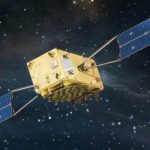Before full service of Galileo Open Service (OS) can be achieved, a new generation of OS-Navigation Message Authentication-enabled user terminals must be developed, tested and implemented, says the European GNSS Agency (GSA).
Before full service of Galileo Open Service (OS) can be achieved, a new generation of OS-Navigation Message Authentication-enabled user terminals must be developed, tested and implemented, says the European GNSS Agency (GSA).
Because of this, the GSA has launched a new funding opportunity to support the development, supply and testing of a Galileo Open Service authentication user terminal. The Galileo OS will soon provide a Navigation Message Authentication (NMA) feature, known as OS-NMA. Via this feature, users can verify that a navigation message comes from a Galileo satellite and not a potentially malicious source. The Open Service is the Galileo program’s free service for positioning, navigation and timing.
The Galileo OS is accessible through the signals at L1, E5a and E5b, whether data or pilot. Several combinations are also possible, such as a dual frequency service based on using L1 and E5a (for best ionospheric error cancellation) or single frequency services (at L1, E5a, E5b or E5a and E5b together) in which case the ionospheric error is removed using a model. Another option is triple frequency services using all the signals together (L1, E5a and E5b), which can be exploited for very precise, centimetric applications, according to the European Space Agency.
The performance objectives in terms of position accuracy and availability will be competitive with respect to existing GNSS and further planned evolutions. In addition, the Open Service will also be interoperable with other GNSS, in order to facilitate the provision of combined services.
OS-NMA Signal-in-Space transmission is expected to begin in 2018, reaching full service capability in 2020. However, before full service can be reached, first the new generation of OS-NMA-enabled user terminals need to be developed, tested and implemented.
To fulfil this need, under its Fundamental Elements funding scheme, the GSA is seeking proposals for the Development, supply and testing of a Galileo open service authentication user terminal (OS-NMA) for the GSA (GSA/OP/23/16).
How to participate
Proposals shall aim to develop a robust, close-to-market OS-NMA User Terminal (OS-NMA UT). The OS-NMA UT shall:
• feature OS-NMA capability
• offer the highest possible level of robustness by implementing further anti-spoofing capability
• meet smart tachograph application requirements.
Within the scope of the procurement, an end-to-end validation platform will be developed to assess the performance of the OS-NMA UT. This user terminal will undergo extensive testing to confirm its robustness under real conditions and against a full set of potential spoofing threats.
All proposals must be received by May 19, 2017. In support of this opportunity, the GSA is organizing several informational sessions, including:
• Receiver Manufacturers’ Workshop in Prague (March 21, 2017)
• Fundamental Elements webinar covering three calls for proposals and an invitation to tender (March 29, 2017).
Registration for these sessions is available here.
Galileo Services
The Galileo system, once fully operational, will offer four high-performance services worldwide:
• Open Service (OS): Galileo open and free of charge service set up for positioning and timing services.
• Commercial Service (CS): A service complementing the OS by providing an additional navigation signal and added-value services in a different frequency band. The CS signal can be encrypted in order to control the access to the Galileo CS services.
• Public Regulated Service (PRS): Service restricted to government-authorised users, for sensitive applications that require a high level of service continuity.
• Search and Rescue Service (SAR): Europe’s contribution to COSPAS-SARSAT, an international satellite-based search and rescue distress alert detection system.
For more on Galileo’s Commercial Service Implementing Decision Adoption, read this Inside GNSS Article by clicking here.






